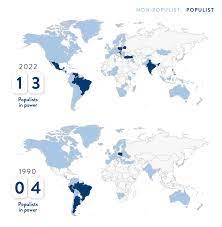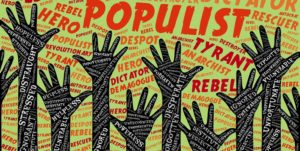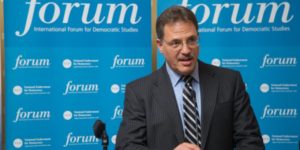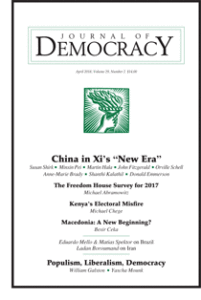
Credit: Tony Blair Institute for Global Change
The danger posed by populism lies in the damage leaders can do to the norms and institutions of liberal democracy. However, a new report finds that, in most of the cases where populist leaders lost power last year, there is limited evidence that key norms such as a free press, an independent judiciary and the peaceful transfer of power have been obviously weakened.
That said, elections in the coming years in countries where populist governments have invoked more radical reform to entrench their positions give less cause for optimism, A Playbook Against Populism? Populist Leadership in Decline in 2021, an analysis from Brett Meyer, a Research Fellow at the Tony Blair Institute for Global Change.
The annual update to the Institute’s Populists in Power database, finds that the number of populist leaders in power at the beginning of 2022 is down from 17 at the beginning of 2021 to 13 – the lowest since 2004. Three of the four populist leaders who lost power were less ideological anti-establishment populists, meaning that the remaining populists are almost all culturally right wing:
- In some countries, populists have departed the scene without doing serious damage to their democracies.
- In others, populists look set to depart amid acrimony designed to weaken the legitimacy of their successors.
- But in a third category, the most malign forms of populism appear to have entrenched themselves through institutional changes.

BPFG
Two common factors appear to have contributed to this significant fall in the number of populist leaders, the report adds:
- First, the pandemic may have reminded the public of the importance of seriousness and expertise in policymaking. Countries with populist leaders around the world had higher Covid-19 case and death rates than those without populist leaders, and populist leaders in Europe have seen a sustained dip in their polling popularity relative to more conventional parties throughout the pandemic.
- Second, unusually broad opposition coalitions have emerged to depose populist incumbents. Historically divided opposition parties adopted a narrow focus in their election campaigns to remove the populist leader. This happened in three out of four populist losses in 2021. We also see evidence of opposition parties following this “playbook” in countries where populist leaders are facing elections in 2022.
 Perhaps the most difficult and important of a series of paradoxes—a set of sobering obstacles to the dream of global democratic renewal – is that it takes a dose of populism to fight populism, argues Stanford University’s Larry Diamond (right).
Perhaps the most difficult and important of a series of paradoxes—a set of sobering obstacles to the dream of global democratic renewal – is that it takes a dose of populism to fight populism, argues Stanford University’s Larry Diamond (right).
Although successful pushbacks against illiberalism must bridge partisan polarization, they often triumph by condemning corruption and crony capitalism and by mounting appeals to economic fairness and inclusion—promises also made by aspiring autocrats, who abandon them once in power and divert attention from their policy failures and limitations through appeals to identity and cultural grievance, he writes for Foreign Affairs:
Democracy’s defenders need to avoid the brutal divisiveness, contempt for institutions, intolerance of pluralism, and exaltation of the leader that define illiberal populism. But they should try to energize voters by expressing moral outrage and empathy for people’s insecurity and loss and, when possible, by putting forward charismatic candidates who embody a message of change. Such a strategy lifted the environmental activist Zuzana Caputova to the presidency of Slovakia in 2019, and it now gives opposition parties a fighting chance of winning electoral victories in Hungary, Poland, and Turkey.
 The Blair institute’s previous reports – Populists in Power Around the World, High Tide? Populism in Power 1990–2020 and Populists in Power: Perils and Prospects in 2021 – placed populist leaders into three sub-categories, Meyer adds:
The Blair institute’s previous reports – Populists in Power Around the World, High Tide? Populism in Power 1990–2020 and Populists in Power: Perils and Prospects in 2021 – placed populist leaders into three sub-categories, Meyer adds:
1. Cultural populism claims that the “true people” are the native members of the nation state, and outsiders can include immigrants, criminals, ethnic and religious minorities, and cosmopolitan elites. Populists argue that these groups pose a threat to “the people” by not sharing their values. Cultural populists tend to emphasize religious traditionalism, law and order, anti-immigration positions and national sovereignty.
2. Socioeconomic populism claims that the “true people” are the honest, hard-working members of the working class, and outsiders are the big businesses, capital owners and international financial institutions benefitting unjustly from the working class’s difficult economic circumstances. This form of populism is almost always accompanied by a left-wing economic ideology, though the specific policy agenda varies across contexts.
3. Anti-establishment populism claims that the “true people” are hard-working victims of a state run by special interests. Often, these special interests are the elites empowered by a former regime (such as former communists in Eastern Europe). Although all forms of populism are antiestablishment, this form distinguishes itself by focusing on establishment elites as the primary enemy of the people and does not sow as many intra-society divisions. Anti-establishment populists tend to compete on issue areas outside the typical left/right political divide, such as corruption, democratic reform and transparency.
 A previous report found that democratic backsliding was more likely under populist leaders than other democratically elected leaders, with populists being more likely to erode checks on executive power, press freedom and other civil liberties. What is most concerning about populists who achieve power is that, by undermining these norms and institutions, they may do permanent damage to liberal democracy.
A previous report found that democratic backsliding was more likely under populist leaders than other democratically elected leaders, with populists being more likely to erode checks on executive power, press freedom and other civil liberties. What is most concerning about populists who achieve power is that, by undermining these norms and institutions, they may do permanent damage to liberal democracy.
While democratic backsliding is more common under populist leaders, most of the countries that have had populist leaders have been able to repair some of the damage done to norms and institutions and are competitive democracies today. The wave of early 20th-century populism appears to have peaked, but it will be some time before we can conclude that liberal democracy is no longer under threat, the study concludes.
If the formation of broad coalitions provides an emerging playbook for fighting populism, it’s important to avoid substantive policy disagreements and focus on a limited program of reforms targeted at shoring up institutions against future populist threats. RTWT
Read this from @institutegc https://t.co/TOk4fSbr3y
— Democracy Digest (@demdigest) January 6, 2022







